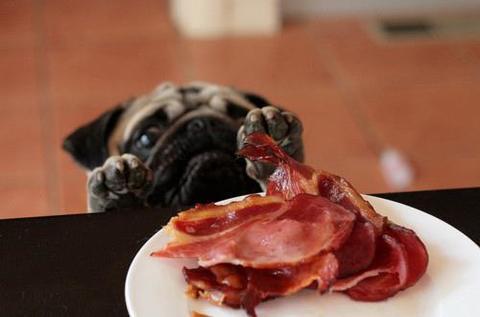
The question of whether fat is good or bad for dogs has been asked for a long time. Many owners are worried that it will cause their dogs to put on weight or give them high cholesterol, etc. So let’s take a look at those and other interesting issues.
To start with, let’s not anthropomorphize or humanize the dog. Just because fats can be bad for us does not mean that they are bad for him, too. And just because we like to drink beer doesn’t mean that our furry friend does, too. He accompanies us at sunset, but not to bars or clubs!
With very few exceptions due to some very specific problems, dogs do not suffer from high cholesterol in the same way that we do. In fact, 99.9% of dogs have cholesterol levels for their entire lives that would be the envy of humans.
Why don’t they have cholesterol problems? The reason may be due to their carnivorous nature. Their diet consisted of large quantities of meat when they hunted, and this was accompanied by fat.
Below, I list some separate facts as “information capsules” to make it easier for you to remember them. However, if you have any questions on the subject, feel free to contact me.
- Fats are also known as oils or lipids, and, more scientifically, as an ethereal extract. Don’t worry about the last one, you’ll probably never hear about it again!
- They give a great flavor to food.
- They are needed for the absorption of the fat-soluble vitamins: A, D, E and K.
- They are a source of essential fatty acids.
- The fats themselves are not a problem for dogs or humans; on the contrary, they are beneficial. The problem lies mainly in the quantity and quality of the fat consumed as well as the amount of exercise the individual is doing.
- We have three sources of energy: proteins (for example, meat), carbohydrates (bread, potatoes, rice), and fats (oil, butter).
- Fat is the component that provides the most energy. One gram of fat produces approximately 9 Calories, compared to 3.5 Calories from protein or carbohydrate.
- The more digestible and metabolizable the fat, the better. In other words, the more efficiently it can be absorbed and utilized, the better. Quality foods, in general, use fats with a digestibility of around 90%.
- Dogs can digest animal fats very well, in general. However, we should not overdo it.
- Omega-3 and Omega-6 fatty acids are types of fat. They are found mostly in fish from cold waters and medium depths. They have many benefits, but in the dog food industry they are used for their positive effects on the coat, as well as therapy for allergies and to combat various dermatological problems.
- Commercial diets contain 7% to 25% fat, depending on the type of food.
- Fats in themselves are not a problem; the secret is in their quality, type and quantity consumed by our best friend.
- Saturated fats are almost always of animal origin. At room temperature they solidify. A perfect example of this is the waxy layer of bacon grease that forms in the pan after frying bacon. Something similar to this happens in our arteries if we consume excess fat, and while this does not happen in dogs, we still should not overdo their intake of fats.
- Unsaturated fats are vegetable fats which remain in a liquid state at room temperature. For example, the oils we use for cooking.
- Fat deficiency can commonly reveal itself reveal in the form of skin problems and a dull coat.
- Excess fat causes the usual problems we are familiar with, mainly weight gain. As I mentioned, cholesterol usually has few, if any, adverse effects on dogs.
Click here and fill out the questionnaire so that we can start working together.
Best regards
